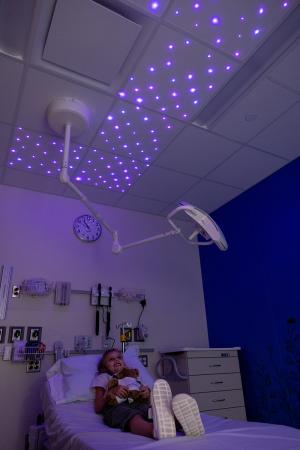Table of ContentsClose
In the News
Selected quotes from Carver College of Medicine faculty featured online and in the news media.

“Allergic reactions can be severe and disconcerting. Educating patients and families in advance about risks and alternatives like desensitization or switching preparations helps reduce anxiety and reinforces that effective treatment options remain.”
David Dickens, MD, FAAP, clinical professor in the Stead Family Department of Pediatrics, emphasizes the importance of preparing families for potential allergic reactions and treatment changes in children with leukemia in an article from MDLinx, an online publication for health care professionals.

“All fireworks, even the legal backyard ones, are combustibles that create their dazzling displays by flinging burning metallic powders using an explosive force. Even ‘just’ a sparkler burns at 1,800 to 3,000 degrees F, which is enough to melt some metals. A three-inch salute firework with 2.5 ounces of pyrotechnic material can produce an air blast equivalent to about 1.5 ounces of TNT.”
In a story on fireworks safety for Parents magazine, Chau Pham, MD, FACS, clinical assistant professor in the Department of Ophthalmology and Visual Sciences, describes how backyard fireworks can pose significant injury risks.

“A host of medical conditions, such as cystic fibrosis, inflammatory bowel disease, recurrent urinary tract infections, and certain medications like antacids or seizure drugs may also increase your risk of developing various types of kidney stones.”
News briefs
Iowans of all ages to benefit from enhanced emergency care services

University of Iowa Health Care has reached an important milestone in its long-term efforts to improve emergency care access for patients of all ages: A new pediatric emergency space is now open within the emergency department at university campus at 200 Hawkins Drive in Iowa City.
The opening of the new pediatric emergency space marks the completion of the final phase of a multiyear expansion project of the emergency department at university campus. The project adds a total of 17 net new adult and pediatric emergency care beds, as well as enhanced and expanded stabilization spaces for behavioral health patients.
“The emergency department expansion project is an example of how investing in modernizing our facilities helps us better fulfill our mission of clinical care, research, and education,” says Denise Jamesion, MD, MPH, UI vice president for medical affairs and the Tyrone D. Artz Dean of the Carver College of Medicine. “More Iowans rely on us than ever before, making it critical to expand access to emergency and trauma care services. Having modern spaces, optimized for patient care and workflow, is an important first step to improving our efficiency and increasing access.”
UI Health Care patients now have three options to seek emergency care: downtown campus, North Liberty campus, and university campus.
"By adding two new emergency departments to our system of care and increasing capacity at university campus, we are able to provide patients with more options and a higher level of coordinated care,” says Andrew Nugent (96MD), MHA, FACEP, clinical professor and chair of the Department of Emergency Medicine. “With these enhanced capabilities, we can streamline our operations and continue improving the patient experience.”
A dedicated space for young Iowans
The newly expanded pediatric emergency space is larger and has more privacy, with private exam rooms and additional space to flex as needed for behavioral health patients.
“We understand having a child with a medical emergency can be a scary experience for families, and we kept this in mind as we worked through our expansion plans,” Nugent says. “We asked ourselves: How do we create a state-of-the-art pediatric space designed with our youngest patients in mind? The result is an updated space that is brighter and offers a more healing environment to help calm our youngest patients.”
Families will notice design features similar to UI Health Care Stead Family Children’s Hospital within the university campus pediatric emergency space, including lighting elements and artwork meant to create a calming, healing space for young patients. Dedicated waiting room spaces for families of pediatric patients have also been constructed.
“Having a separate waiting room will hopefully help alleviate any of the fears families may have about needing emergency care,” says Sarah Miller (07MD), clinical associate professor and pediatric medical director in the Department of Emergency Medicine. “Our faculty and staff here are specially trained to support young patients needing emergency care. We’re excited to also welcome a child life specialist to our emergency department to add another layer of support.”
Improving Access to Emergency Care

UI Health Care leaders expect a 10% increase in emergency department visits across its three campuses in the next year.
“More community members are seeking emergency care at our downtown and North Liberty campuses,” Nugent says. “For example, a patient with a broken limb who may have previously gone to the university campus may now go to the North Liberty campus. Or a patient with the flu who needs IV fluids and antivirals may go to downtown campus. This frees up capacity at university campus for us to care for the most complex cases.”
All three of UI Health Care’s emergency departments have advanced capabilities and are equipped to handle and triage all types of emergencies.
“No matter where you go first, we will help you get the right care," Nugent says.

University of Iowa Carver College of Medicine faculty members Val Sheffield, MD, PhD, and Edwin Stone, MD, PhD (89R, 90F, 92F), are recipients of the 2025 Helen Keller Prize for Vision Research from the vision research nonprofit BrightFocus Foundation and the Helen Keller Foundation for Research and Education.
Sheffield, a professor in the Stead Family Department of Pediatrics–Medical Genetics and Genomics with a secondary appointment in the Department of Ophthalmology and Visual Sciences, developed methods to facilitate gene identification in human genetic diseases. This work includes major contributions to the completion of a high-resolution polymorphic genetic map of the human genome (the first completed goal of the Human Genome Project). His work has advanced the understanding of hereditary blindness and other vision-affecting disorders like diabetes and hypertension by identifying numerous genes linked to inherited blindness, including glaucoma, retinitis pigmentosa, and Bardet-Biedl syndrome.
Stone is a professor in the Department of Ophthalmology and Visual Sciences and director of the UI Institute for Vision Research, helped define the genetic basis of blinding eye diseases — ranging from common causes of blindness such macular degeneration and glaucoma to rare conditions like retinitis pigmentosa and Leber congenital amaurosis. He founded the Carver Nonprofit Genetic Testing Laboratory at Iowa, which provides low-cost genetic tests to patients in every state of the U.S. and more than 60 countries. He also created an open-access web-based teaching tool with thousands of downloadable full-resolution images to help physicians diagnose Mendelian retinal diseases.
A proliferation of specialty shops and weak enforcement penalties are hampering efforts to deter illegal sales of tobacco and vape products to those under 21 in Iowa, according to a study by University of Iowa researchers.

Professor Pediatrics-Pulmonology
The study, led by Anthony Fischer (09MD/PhD, 15F), director of the pulmonary medicine division in the Stead Family Department of Pediatrics, reviewed retail inspection data in Iowa collected between 2017–2023, during which time 24% of retail sites had a violation and 6.9% of inspections had violations.
Key takeaways from the study:
- Pauses in inspections may cause a surge in violations. The highest violation rate surged in 2021 following the first year of the COVID-19 pandemic, when fewer inspections took place due to public health guidelines.
- Vape shop proliferation may impact the ability to provide adequate inspections. Vape shops and other specialty shops increased nearly four-fold during the time studied and may exceed Iowa’s capacity to inspect them.
- Enforcement penalties may not be effective. While it is estimated that tobacco companies spend $100 million per year marketing products in Iowa, federal penalties for violating age restrictions during the 2017–2023 study period totaled just over $150,000, according to the U.S. Food and Drug Administration.
The findings indicate a need for more inspections and increased penalties for illegal tobacco sales, including restricting tobacco licenses for multiple offenses, according to the researchers.
Findings from a University of Iowa-led research team add to mounting evidence that uric acid – a naturally occurring molecule — protects the brain during stroke and may help to improve outcomes for the almost 795,000 Americans who have a stroke every year.
Previous research at Iowa, led by Enrique Leira, MD (98F), MS, professor in the Department of Neurology, and Anil Chauhan, PhD, professor in the Department of Internal Medicine, has shown that uric acid may be able to minimize this damage. This “cerebroprotective” effect makes uric acid an attractive candidate to add to current stroke therapy.
The new study, published in March in the journal Stroke, shows that uric acid provides cerebroprotection when tested in both male and female rodents that had health factors common to patients that have had a stroke.
University of Iowa Health Care Medical Center retains its ranking as Iowa’s No. 1 hospital in Iowa and is recognized in eight specialties in the 2025–2026 “Best Hospitals” rankings published by U.S. News & World Report.
Four adult care specialties were ranked in the top 50 nationally:
- Ophthalmology: No. 6
- Ear, nose, and throat: No. 33
- Cancer: No. 42
- Obstetrics and gynecology: No. 43
Four specialties were designated as “High-Performing,” which places them in the top 10% of hospitals across the country:
In its 2025-2026 edition of “Best Medical Schools,” U.S. News ranks the Carver College of Medicine in these categories:
- Physician Assistant: No. 1 (tie)
- Physical Therapy: No. 3
- Most Graduates Practicing in Rural Areas: No. 34
- Most Graduates Practicing in Health Professional Shortage Areas: No. 51
- Most Graduates Practicing in Primary Care: No. 112
- Most Diverse Medical Schools: No. 97
- Primary Care: Tier 2
- Research: Tier 2
As with last year’s rankings, U.S. News placed medical schools in one of four tiers for the Primary Care and Research categories. Each school’s tier was derived from an overall score, calculated across several factors. The first two tiers in each category comprise approximately 50 medical schools.
The U.S. News rankings for “Best Children’s Hospitals” will be released later this fall.

Nearly 100 University of Iowa Health Care resident and fellow physicians and their spouses came together in late July to explore career opportunities with health care organizations across the state. Ten Iowa-based health systems, clinics, and critical access hospitals attended the event with the goal of encouraging medical trainees to stay in Iowa to practice medicine.
UI Health Care hosted the event — co-sponsored by Great River Health, the Iowa Hospital Association, and the Iowa Medical Society — as part of a broader initiative to address the state’s physician workforce needs. The state ranks 44th in the nation for its patient-to-physician ratio.
Nearly half of Iowa’s physicians receive medical education or training at the UI. However, the number of Iowa medical school graduates currently exceeds the number of residency training opportunities available in the state, requiring many medical school graduates to leave Iowa to begin residency training. It’s a gap that state legislators and medical school administrators are working to close.
“We are taking a strategic, multi-faceted approach to encouraging UI medical student and resident graduates to stay and practice in Iowa,” says Gerard Clancy, MD, the chair of UI Health Care’s physician workforce task force and senior associate dean for external affairs at the Carver College of Medicine. “We know we need to lay the foundation early on, which is why we are also focused on increasing the number of qualified Iowans who apply to medical school at Carver College Medicine, as well as the number of medical student graduates who match in Iowa-based residencies.”
A study led by University of Iowa Health Care researchers revealed a significant association between high blood pressure during pregnancy (gestational hypertension) and an increased risk of seizures in children.
The study, published June 16 in the Journal of Clinical Investigation, used extensive clinical databases and innovative animal models to uncover this critical link. The findings also suggest that inflammation in the brain may play a role in connecting gestational hypertension to seizure risk and could potentially be targeted to prevent seizures in children exposed to hypertension in the womb.

“We examined large national clinical databases as well as databases at the University of Iowa and Stanford University, and we even have international collaborations with database analysis from our collaborators in Taiwan," says the study’s senior author, Alex Bassuk, MD, PhD, professor and chair of the Stead Family Department of Pediatrics at Iowa and senior author on the study. "This was a real team effort spanning several countries and institutions, and involved multiple departments at Iowa, including pediatrics, obstetrics and gynecology, and psychology.”
Gestational hypertension, a common condition affecting nearly 16% of pregnancies in the United States, has long been associated with various health complications for both mothers and their children.
The team hopes the new understanding of the link between high blood pressure in pregnancy and pediatric seizures in offspring will open new avenues for research.
University of Iowa Health Care leaders have announced appointments to several key positions over the past several months:

Nitin Karandikar, MD, PhD
Enterprise chief strategy officer
Karandikar began this new role on July 1 and continues to serve as chair and department executive officer of the Department of Pathology. As enterprise chief strategy officer, he works with the executive leadership team to shape strategic direction across UI Health Care’s tripartite mission of clinical care, research, and education. Read news story.

H. Henry Lai, MD
Chair and department executive officer, Department of Urology Lai, who begins his new role on Jan. 31, 2026, will oversee all aspects of the department and represent urology faculty and staff across the university and in interactions with practitioners across Iowa. He serves as a professor of urologic surgery at Washington University School of Medicine in St. Louis. Read news story.

Amy Stier (03MD, 06R, 07F, 11MME) Associate dean for graduate medical education–designated institutional officer, Carver College of Medicine

Tracey Cho, MD, MA Associate dean for graduate medical education–leadership and development, Carver College of Medicine
Stier and Cho oversee the Office of Graduate Medical Education and work together to manage and strengthen the learning environments for more than 650 resident physicians and over 200 fellow physicians while also ensuring that accreditation requirements are met. Stier serves as a clinical professor and vice chair for education in the Stead Family Department of Pediatrics. Cho is a clinical professor in the Department of Neurology. Read news story.

J. Joshua Wilda, MPA Associate vice president for information systems and chief information digital officer Wilda, who joined UI Health Care Sept. 2, leads the Health Care Information Systems team and oversees information technology services, including technical support, applications development, and clinical applications across the entire health care system. Wilda previously served as chief digital and information officer at University of Michigan Health–Regional Network. Read news story.
Paper Trail
Notable manuscripts recently published by Carver College of Medicine faculty.
Nature
The RAD52 Double-Ring Remodels Replication Forks Restricting Fork Reversal. Honda M, Razzaghi M, Gaur P, Malacaria E, Marozzi G, Di Biagi L, Aiello FA, Paintsil EA, Stanfield AJ, Deppe BJ, Gakhar L, Schnicker NJ, Spies MA, Pichierri P, Spies M. Nature 2025 May;641(8062):512-519. doi: 10.1038/s41586-025-08753-1. Epub 2025 Apr 2.
JAMA
Journal of Clinical Oncology
RP1 Combined with Nivolumab in Advanced Anti-PD-1-Failed Melanoma (IGNYTE). Wong MK, Milhem MM, Sacco JJ, Michels J, In GK, Couselo EM, Schadendorf D, Beasley GM, Niu J, Chmielowski B, Wise-Draper TM, Bowles TL, Tsai KK, Lebbé C, Gaudy-Marqueste C, Middleton MR, Skolariki A, Samson A, Chesney JA, VanderWalde AM, Zakharia Y, Harrington KJ, Appleton E, Bommareddy PK, Zhu J, Viana M, Hou JW, Coffin RS, Robert C. J Clin Oncol 2025 Jul 8:101200JCO2501346. doi: 10.1200/JCO-25-01346. Epub ahead of print.
